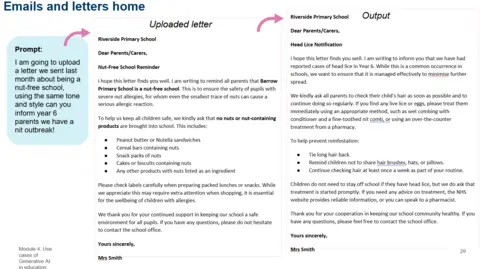 Getty Images
Getty ImagesThe government says AI should only be used for "low-stakes" marking
Teachers in England can use artificial intelligence (AI) to speed up marking and write letters home to parents, new government guidance says.
Training materials being distributed to schools, first seen exclusively by the BBC, say teachers can use the technology to "help automate routine tasks" and focus instead on "quality face-to-face time".
Teachers should be transparent about their use of AI and always check its results, the Department for Education (DfE) said.
The Association of School and College Leaders (ASCL) said it could "free up time for face-to-face teaching" but there were still "big issues" to be resolved.
BCS, the Chartered Institute for IT, said it was an "important step forward" but teachers would "want clarity on exactly how they should be telling... parents where they've used AI".
Teachers and pupils have already been experimenting with AI, and the DfE has previously supported its use among teachers.
However, this is the first time it has produced training materials and guidance for schools outlining how they should and should not use it.
The DfE says AI should only be used for "low-stakes" marking such as quizzes or homework, and teachers must check its results.
They also give teachers permission to use AI to write "routine" letters to parents.
One section demonstrates how it could be used to generate a letter about a head lice outbreak, for example.
 Department for Education
Department for EducationIn this example, teachers are shown how they could use AI to generate a letter to parents based on the tone and style of previous letters
Emma Darcy, a secondary school leader who works as a consultant to support other schools with AI and digital strategy, said teachers had "almost a moral responsibility" to learn how to use it because pupils were already doing so "in great depth".
"If we're not using these tools ourselves as educators, we're not going to be able to confidently support our young people with using them," she said.
But she warned that the opportunities were accompanied by risks such as "potential data breaches" and marking errors.
"AI can come up with made-up quotes, facts [and] information," she said. "You have to make sure that you don't outsource whatever you're doing fully to AI."
The DfE guidance says schools should have clear policies on AI, including when teachers and pupils can and cannot use it, and that manual checks are the best way to spot whether students are using it to cheat.
It also says only approved tools should be used and pupils should be taught to recognise deepfakes and other misinformation.
Education Secretary Bridget Phillipson said the guidance aimed to "cut workloads".
"We're putting cutting-edge AI tools into the hands of our brilliant teachers to enhance how our children learn and develop – freeing teachers from paperwork so they can focus on what parents and pupils need most: inspiring teaching and personalised support," she said.
Pepe Di'Iasio, ASCL general secretary, said many schools and colleges were already "safely and effectively using AI" and it had the potential to ease heavy staff workloads and as a result, help recruitment and retention challenges.
"However, there are some big issues," he added. "Budgets are extremely tight because of the huge financial pressures on the education sector and realising the potential benefits of AI requires investment."
Research from BCS, the Chartered Institute for IT, at the end of last year suggested that most teachers were not using AI, and there was a worry among those who were about telling their school.
But Julia Adamson, its managing director for education, said the guidance "feels like an important step forward".
She added: "Teachers will want clarity on exactly how they should be telling those parents where they've used AI, for example in writing emails, to avoid additional pressures and reporting burdens."
The Scottish and Welsh governments have both said AI can support with tasks such as marking, as long as it is used professionally and responsibly.
And in Northern Ireland, last week education minister Paul Givan announced that a study by Oxford Brookes University would evaluate how AI could improve education outcomes for some pupils.














